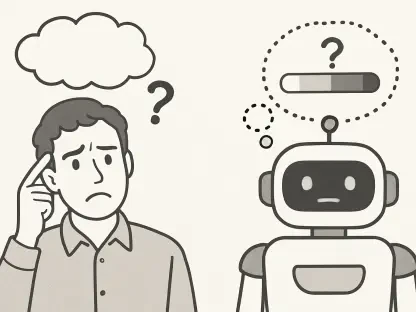The rapid integration of artificial intelligence into talent acquisition is revolutionizing the way companies identify, attract, and retain top talent across industries, while also navigating a fiercely competitive job market and persistent talent shortages. As businesses face these challenges, AI emerges as a game-changer, offering innovative solutions to streamline hiring processes while posing unique ethical dilemmas. With projections suggesting the creation of millions of new roles due to this technology, the impact of AI extends beyond mere efficiency, promising a fundamental shift in workforce dynamics. This transformation is fueled by cutting-edge tools that analyze vast datasets, predict candidate fit, and enhance engagement, yet it also raises critical questions about fairness and the human touch in recruitment. Exploring this dual nature of opportunity and challenge sets the stage for a deeper understanding of how AI is reshaping the hiring landscape.
The Promise of AI in Recruitment
Enhancing Efficiency Through Automation
Artificial intelligence is dramatically improving the efficiency of talent acquisition by automating repetitive tasks that once consumed significant time and resources. Advanced tools powered by machine learning can sift through thousands of resumes in moments, identifying top candidates based on specific criteria and predicting their potential success in a role. This capability not only shortens the time-to-fill for open positions but also allows recruiters to focus on strategic aspects like building relationships with candidates. Reports from industry leaders indicate that agentic AI systems, which operate with a degree of autonomy, are particularly effective in engaging prospects and addressing talent gaps in high-demand fields such as technology. By reducing manual workloads, these systems enable hiring teams to prioritize quality over quantity, ensuring better alignment between organizational needs and candidate skills in an increasingly fast-paced market.
The ripple effects of this automation extend to candidate experience, a critical factor in attracting top talent. AI-driven platforms personalize outreach by tailoring communications to individual preferences and career aspirations, fostering a sense of connection even in a digital-first process. Beyond personalization, these tools provide real-time insights into hiring trends, helping companies adapt swiftly to shifting market demands. For instance, predictive analytics can highlight emerging skill requirements, allowing businesses to stay ahead of the curve. While the benefits of efficiency are undeniable, the reliance on such technology also sparks debate about maintaining a balance with human oversight to ensure that the recruitment process remains empathetic and nuanced, rather than purely transactional.
Driving Job Creation and Innovation
One of the most striking outcomes of AI’s integration into talent acquisition is its potential to generate substantial job growth. According to estimates from global economic forums, AI could create up to 78 million new roles in the coming years, spanning diverse sectors from tech development to data analysis. This surge is driven by record-breaking investments in AI technologies, which fuel advancements in recruitment tools and broader business strategies. Companies are not merely replacing human roles with machines but are instead reshaping positions to require a blend of domain expertise and technological proficiency. This evolution underscores a shift toward roles that support AI implementation, such as data scientists and ethics specialists, highlighting the technology’s role as a catalyst for innovation rather than displacement.
Moreover, fostering a culture of experimentation with AI within organizations is proving vital for employee development and retention. By encouraging staff to engage with emerging tools, businesses are accelerating skill acquisition and preparing their workforce for an AI-enhanced future. Statistics reveal that a significant percentage of technology leaders are expanding their teams to accommodate generative AI capabilities, reflecting a proactive approach to workforce planning. This trend emphasizes the importance of continuous learning as a cornerstone of career growth in an era where adaptability is paramount. As industries embrace these changes, the focus remains on leveraging AI to not only fill positions but also to build dynamic, future-ready teams capable of driving sustained progress.
Navigating the Challenges of AI Adoption
Addressing Ethical Concerns and Bias
While AI offers transformative benefits in talent acquisition, it also introduces complex ethical challenges that demand careful consideration. A primary concern is the risk of algorithmic bias, where systems inadvertently favor certain demographics over others due to flawed data inputs or design. Such issues can perpetuate inequities in hiring, alienating diverse talent and undermining trust in the process. Industry surveys indicate that a substantial portion of HR professionals fear that over-reliance on automated tools might strip away the personal connection essential to recruitment, turning it into a cold, mechanical exercise. Striking a balance where AI supports rather than supplants human judgment is critical to maintaining fairness and inclusivity in hiring practices.
Beyond bias, the potential for inaccuracies in AI predictions poses another hurdle. Tools that misjudge candidate suitability can lead to poor hires, costing companies time and resources while frustrating applicants. The consensus among experts is that ethical implementation must be prioritized, with transparent methodologies and regular audits to ensure accountability. Combining technology with human insight helps mitigate these risks, allowing for a more holistic evaluation of candidates that considers both quantitative metrics and qualitative attributes. As businesses navigate this landscape, the focus should be on designing AI systems that enhance decision-making while safeguarding the principles of equity and empathy that underpin effective recruitment.
Upskilling for a Changing Workforce
The rapid adoption of AI in talent acquisition necessitates a parallel emphasis on upskilling to prepare workers for evolving job demands. As automation reshapes roles, there is an urgent need to bridge the gap between current skills and future requirements, particularly in areas like data literacy and AI proficiency. Projections suggest that millions of new positions will emerge, but without adequate training, many individuals risk being left behind. Businesses are increasingly investing in learning programs to equip their teams with the tools needed to thrive in an AI-centric environment, recognizing that talent development is as crucial as talent acquisition in maintaining a competitive edge.
This focus on upskilling also aligns with broader strategic goals of fostering innovation and diversity within organizations. Skills-based hiring, powered by generative AI, offers a pathway to assess candidates based on potential rather than traditional credentials, opening doors for underrepresented groups. Meanwhile, industry trends show a maturing AI market with significant consolidation, as enterprises acquire startups to integrate cutting-edge solutions into their operations. This dynamic environment calls for continuous adaptation, where employees and employers alike must commit to lifelong learning. By prioritizing education alongside technology, companies can ensure that the benefits of AI are realized equitably, creating a workforce that is both skilled and resilient.
Reflecting on AI’s Transformative Journey
Looking back, the integration of AI into talent acquisition marked a pivotal shift, redefining efficiency and opening doors to unprecedented job creation with millions of new roles established. Challenges such as algorithmic bias and the risk of dehumanizing recruitment processes were met with a concerted push for ethical guidelines and human oversight, ensuring that technology served as a partner rather than a replacement. The journey revealed a critical need for upskilling, as industries adapted to new demands by investing in training and skills-based hiring. Moving forward, the focus should center on refining AI tools to eliminate biases while scaling education initiatives to prepare workers for emerging opportunities. Businesses are encouraged to adopt a balanced approach, blending innovation with empathy to build inclusive, dynamic teams. This roadmap offers a vision for sustained growth, where the synergy of human insight and artificial intelligence paves the way for a more equitable and innovative hiring landscape.









